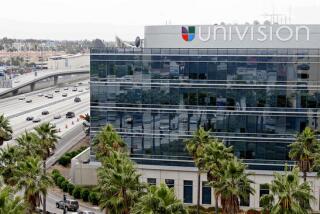Citigroup Will Buy Mexico’s No. 2 Bank
- Share via
MEXICO CITY — Citigroup will acquire Mexico’s second-largest banking group for $12.5 billion, the companies said Thursday, in a dramatic step toward the financial integration of North America.
The largest takeover in Mexican history further consolidates Mexico’s banking system, which is recovering after the chaos of a mid-1990s banking crisis that forced a $100-billion bailout.
The new bank will retain the powerful Banamex brand of Mexican group Banamex-Accival, or Banacci for short. Citigroup hopes Banacci, Mexico’s oldest banking group, will help it penetrate the growing Latino market in the United States.
Citigroup Chairman Sanford I. Weill told analysts in a conference call Thursday that the Mexican economy is “underbanked,” with lending accounting for just 15% of gross domestic product compared with 29% in Brazil and 72% in the U.S. “So you can get a feel for what we think the opportunities for growth are going to be in the next five years,” he said.
A healthy banking system is vital for President Vicente Fox’s ambitious growth plans. Bank credit contracted in 1999 and barely grew last year, applying a heavy brake on faster growth in Mexico’s otherwise vibrant economy.
In response to the takeover, the peso strengthened by more than 2% on Thursday to 8.97 to the dollar, the Mexican currency’s highest level since August 1998. Banacci’s stock price shot up 29.4%, whereas Citigroup fell $1.10 to close at $50.69 in New York Stock Exchange trading. The news also powered the Mexican stock market higher, driving the IPC index up 358.80 points, or 5.9%, to 6,392.77.
Citigroup is the only U.S. bank to have entered retail banking in Mexico, having bought the small, government-intervened Confia Bank in May 1998 for a bargain price of $45 million plus a capital injection. This time, Citigroup is paying $6.25 billion cash and $6.25 billion in stock for Banacci, whose Banamex bank is much healthier and far bigger than the scandal-plagued Confia. The deal also includes Banacci’s insurance, pension and other businesses.
The single investment is equal to about half the total direct foreign investment that Mexico obtained in all of 2000, already a record year, and will help Mexico avoid problems with its international balance of payments.
In creating Mexico’s largest bank, Citigroup and Banamex-Accival will combine Citibank’s existing 197 branches with Banamex’s 1,379 branches, forming a vast network of 1,576 branches.
Banamex, founded in 1884, will continue to be run by Roberto Hernandez and Alfredo Harp, who are the two biggest shareholders in the Banacci holding company. Weill said both Hernandez and Harp will join the Citigroup board, noting this is the first time that two board members are being added through an acquisition of an emerging-market institution.
The Banamex takeover accelerates a trend of foreign banking penetration of the Mexican banking sector as it recovers from the brutal fallout of the December 1994 peso crisis. Until now, Spanish banks have led the foreign charge, followed by Canadian and Asian banking groups.
Indeed, Banamex briefly lost its position as Mexico’s largest bank when the Spanish group BBVA merged its Mexican operation with Bancomer, then Mexico’s No. 2 bank.
Of the 18 banks privatized in the early 1990s, just seven are open for business. The rest either went bankrupt, were seized by the government or were gobbled up by other banks.
Victor Manuel Herrera, managing director of rating agency Standard & Poor’s in Mexico, said, “We are still in a process of consolidation. We won’t have the same number of banks tomorrow that we have today. The Mexican banks are still not competitive with U.S. banks. If you look at the U.S. trend of bank mergers, we have to pass through the same process.”
The Citigroup takeover is healthy because it will introduce top technology and new products as well as economies of scale, Herrera added. “Our banks haven’t been loaning in recent years. And when you have a market with few bankable customers, it is better to have volume so you can reduce costs.”
The revival of the Mexican economy, which grew by 6.9% last year, makes the Mexican market increasingly attractive to Citigroup, which has operated in Mexico since 1929. So does the huge increase in trade between Mexico and the United States since the North American Free Trade Agreement was adopted in 1994. Last year, it rose to $275 billion.
Mexican analysts largely welcomed the deal.
Mauricio Gonzalez, head of the prominent Economists and Associates Group, said the deal would “raise confidence in Mexico at a time when mistrust of other emerging-market countries is growing.” He mentioned Brazil, Argentina and Ecuador as examples.
He also said it would give Banamex greater access to foreign capital at lower interest rates than Mexican banks can now obtain.
“The question is will they pass the benefits on to depositors and borrowers. Borrowing costs could drop to a degree, but they may try to take advantage of it simply to generate more profits,” Gonzalez said.
More to Read
Inside the business of entertainment
The Wide Shot brings you news, analysis and insights on everything from streaming wars to production — and what it all means for the future.
You may occasionally receive promotional content from the Los Angeles Times.










